This is an archived article and contains information that has not been updated or reviewed since it was originally published. For more information regarding the content in this article, please contact us.
Our team tuned into the annual Google Marketing Livestream to keep up to date on Google’s latest announcements and hints on what to expect for advertisers on the Google ecosystem in the coming months.
Here are some highlights from the event:
- Expanded eligibility for image extensions in Google search ads
- Expanded eligibility for using customer match (email lists)
- A new bidding strategy for YouTube (target ROAS)
- Expanded eligibility for customizers in responsive search ads (RSA)
- Enhanced conversions to respond to the loss of 3rd party cookies
- Shopping integrations available in YouTube
- Expanded Google Maps features for Local Smart campaigns
A New Era of Privacy in Digital Marketing
The Google Marketing Livestream is always a flashy affair. Not-so this year, where things kicked off on a serious note. Google is all-guns-blazing at defending their mission of providing a “privacy-safe, ad-funded internet”. In this new era of privacy (iOS 14/ no 3rd party cookies), we all know Google will have to make some substantial changes to both their advertising and measurement frameworks. It is clear they are well aware of the enormity of these challenges. Despite this, they seem to be confident that they have the solutions to make digital advertising experiences both effective for advertisers and complaint with privacy requirements of users.
New Features and Advertising Options Announced at Google Marketing Live 2021
Expanded eligibility for image extensions in Google search ads
Up until now, image extensions have only been available to a small number of advertisers. Google has announced they will now be available to most accounts.
Image extensions are an excellent way to add a visual component to an ad. They can improve click-throughs, and they take up more of the SERP results (bumping your competition off the first screen on a mobile device). Read more about Image Extensions
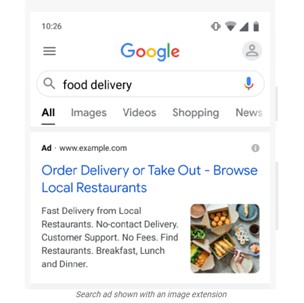
Expanded eligibility for using customer match
Customer match is a feature that allows you to upload customer data to the Google Ads platform to improve your audience targeting and allow for some sophisticated bidding strategies. Previously, advertisers had to meet a minimum spend threshold and have a large amount of customer data being to implement Customer Match.
Google has announced that Customer Match will be available to nearly all advertisers. Read more about Customer Match.
A new bidding strategy for YouTube & Discovery ads
Google has announced that Target ROAS bidding will now be available for all advertisers for Video Action campaigns (YouTube). They expect to rollout Target ROAS bidding for Discovery Campaigns in the coming months.
The Target ROAS bidding strategy optimizes your campaigns based on the target return-on-ad-spend you set. It can be a very effective strategy in accounts that effectively track transaction data. Read more about Target ROAS bidding.
Expanded eligibility for customizers in responsive search ads (RSA)
Up until now, ad customizers for responsive search ads have only been available to select advertisers. Ad customizers allow your ads to dynamically adjust to user queries and schedules. With ad customizers, you can dynamically insert keywords, and modify price, location or discounts based on set parameters. Customizers are particularly useful for advertisers who have large product inventories across broad geographic regions. Read more about ad customizers for RSAs.
Enhanced conversions to respond to the loss of 3rd party cookie data
There is a great upheaval in digital advertising this year (that has nothing to do with the pandemic). As users demand more privacy in their online interactions, major internet forces have responded by agreeing to stop the use of 3rd party cookies. This has tremendous implications for advertising online. One of Google’s approaches to the loss of 3rd party data is to add a first-party cookie conversion tracking option through Google Tag Manager.
We expect we will have to transition most of our current conversion tracking in Google Analytics/Google Ads to this framework. More to come on this subject, but you can read more about Enhanced Conversions.
Shopping integrations available in YouTube
If you are using Google Shopping ads, you can now connect your Google Merchant Center feed to your YouTube Video Action campaigns to showcase your top products. Google is also expected to roll this out to Discovery ads in the coming months.
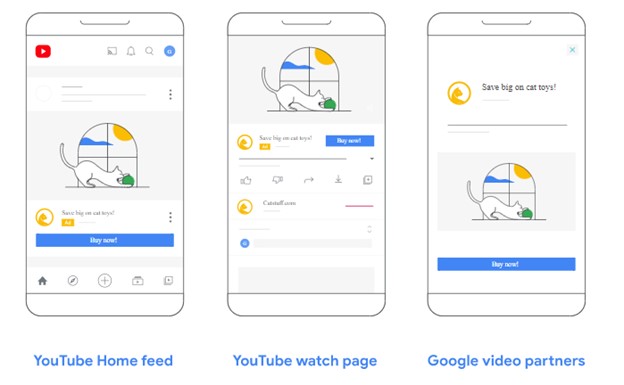
Expanded Google Maps features for Local Smart campaigns
Google announced another suite of features to entice advertisers to use Local Campaigns (Smart Campaigns). Three new features will now be available: auto-suggest, navigational ads, and “similar places” ads. Read the details of the new options for increasing in-store sales.
Auto-Suggest
Users will now see a list of suggested similar businesses when they type a query into Google Maps (similar to Google Search). Advertisers will display in the first positions.
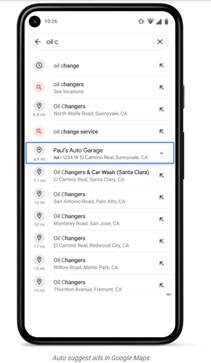
Navigational Ads
Get ready to see a lot more advertising during your drive. Navigation ads will show relevant advertised business listings along a navigation route. Google promises these ads, “Aren’t intrusive and display in a way that is safe for the driver”. I think that remains to be seen ? .
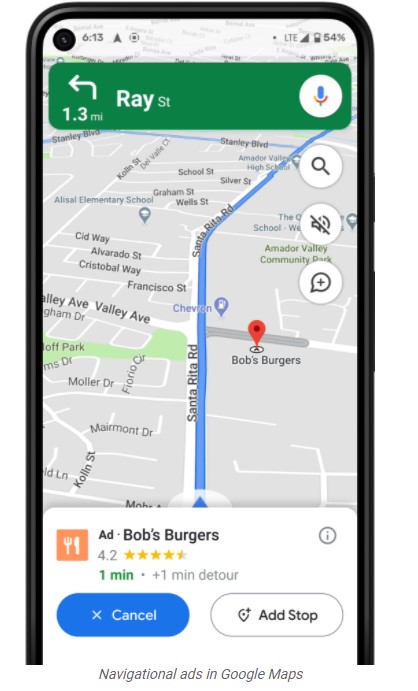
Similar Places Ads
Using similar places ads, you can have your business listing display in maps when someone searches for a similar business nearby.
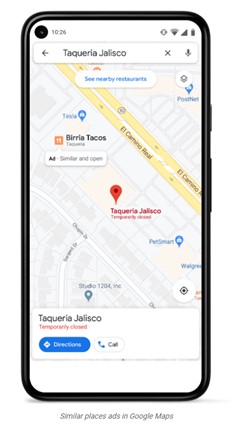
While some of these features are certainly enticing. They are currently limited to “Local Campaigns”. Local campaigns are fully automated and offer very little control to the advertiser and poor performance reporting. We hope to test some of these new features in the coming months to see if they add value for our clients.
More Options, Less Control, as Advertising Reshapes Itself in 2021
There were several enticing tidbits and new offerings announced at this year’s event. As Google continues to offer more features to advertisers, it is clear they intend to provide less direct control over ad performance. Advertisers are going to need experienced marketers to avoid the pitfalls of greater automation. Our approach has always been to trust but test. This remains true more than ever.
We know Google will need to dramatically shift advertising and measurement frameworks to adjust to the new realties imposed by increased privacy requirements. Advertisers will also need to remain agile and monitor campaigns closely as we all undergo this large shift in digital marketing paradigms.
Digital advertising is getting (more) complicated.



